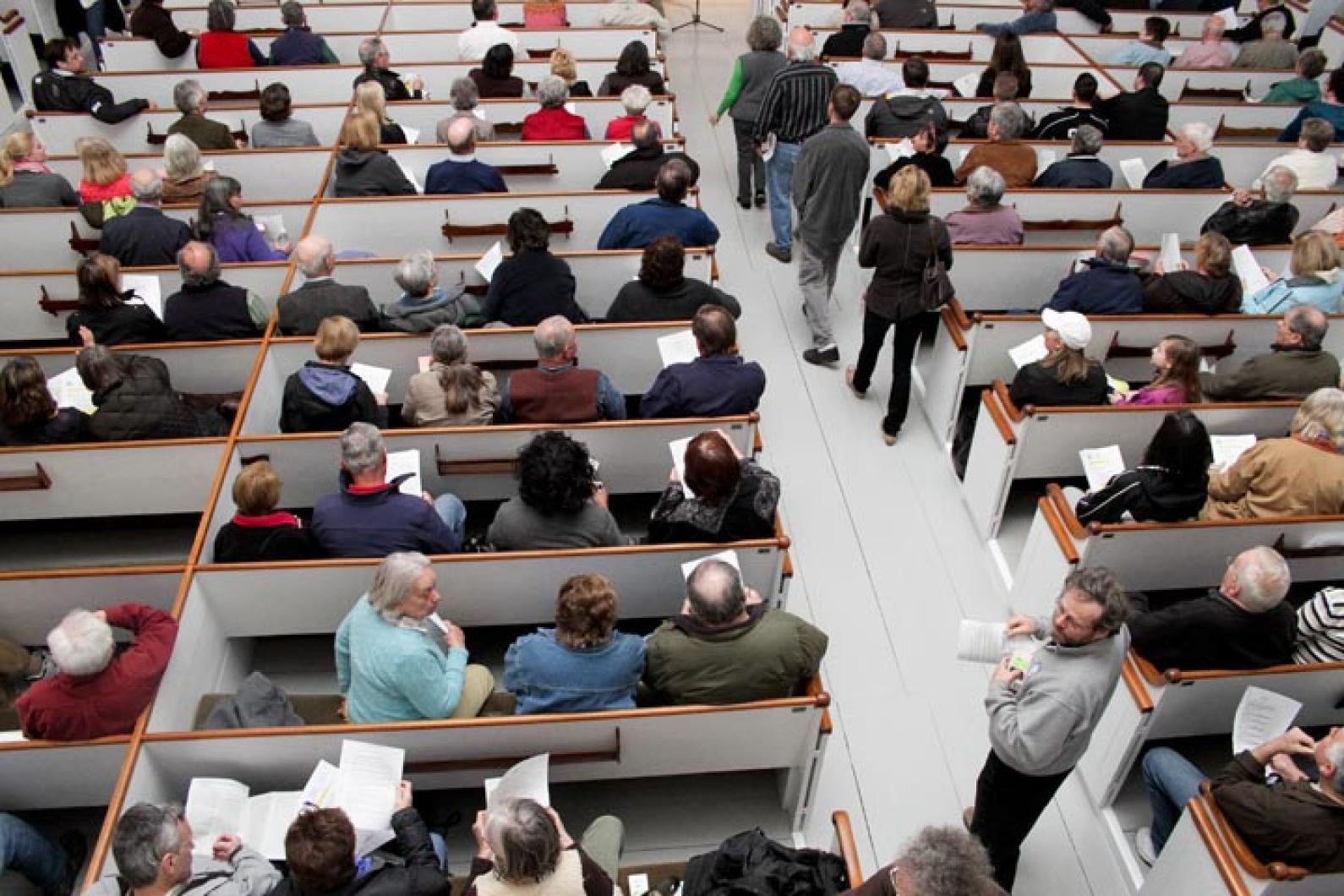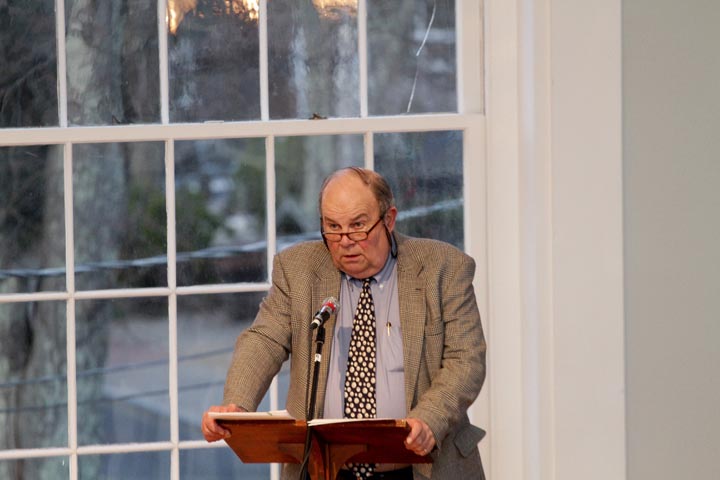Edgartown voters easily approved $4.9 million in funding for a new town library, along with dozens of other spending requests during a lengthy annual town meeting Tuesday night.
With a gathering of 305 voters at the Old Whaling Church, town meeting members approved most of the items on the 63-article annual town meeting warrant and a 12-article special town meeting warrant.
A town operating budget of $28.3 million was approved, after being amended slightly. Harbor master Charlie Blair, using money from the dredge gift account, reduced his spending request for dredge salaries and expenses by $100,000.
Massachusetts Estuaries Program studies of Poucha Pond, Cape Pogue, Katama Bay and Oyster Pond were approved at the cost of $272,500, though some questioned whether the studies were needed, with similar appraisals of Sengekontacket Pond already completed.
Steve Ewing spoke in favor of the studies on behalf of shellfish constable Paul Bagnall, who was in Wyoming welcoming his first granddaughter. Mr. Ewing said the studies would ensure healthy water in the future, and that they come at a deal to Edgartown, with the state funding half the project’s cost.
The vote in favor of new library funding was the final step in a multi-year effort to replace or expand Edgartown’s existing library, built in 1904. The proposal was approved after some debate, with only two dissenting votes. Applause and whistles filled the church after the vote.
A state library building grant for $5 million will make up the rest of the cost of the new library, which will be built at the site of the old Edgartown school on the Edgartown-West Tisbury Road.
“This is the final vote. This will make the home run,” selectman and library building committee chairman Michael Donaroma told the meeting. “This is a fantastic project; I can’t explain or say in words how exciting this project really is.”
A proposal to allow the selectmen to sell the Captain Warren House, which was purchased several years ago with an eye toward expanding the current library, was also approved.
The Martha’s Vineyard Preservation Trust has expressed interest in taking stewardship of the old library building once a new library is built. Mr. Donaroma said the trust proposes to restore the building and create a maritime history and welcome center that would showcase Edgartown history, all at no cost to the town.
A few voters had questions about the ultimate use of the building, but town counsel Ronald H. Rappaport reminded the group that decisions regarding its fate would come before future town meetings.
Outside the Whaling Church before the meeting, library employees and supporters passed out cards that entitled library patrons to a one-time waiver on library fines.
Most of the articles passed unanimously, including $700,500 in Community Preservation Act funds for the restoration and preservation and exterior of town hall, $130,000 to rebuild and resurface various town streets, $50,000 for building and repairing assorted town sidewalks, bike paths, and storm water drainage systems, and $44,500 to repair and paint the exterior of the Council on Aging’s Anchors building.
There was debate over a proposal to amend the town zoning bylaws to allow substandard lots to be used for affordable housing, with the article eventually defeated amid concerns about over development and the impact on neighborhoods like Ocean Heights.
Roger Becker called the proposal “a gimmick apparently written by the real estate industry here,” and he proposed an amendment to get rid of a stipulation that if the lots were bought and then sold again within 15 years, the new purchaser would have to meet all the requirements of the bylaw. He proposed getting rid of the time limitation.
The amendment failed, but in the end, it did not matter, with a two-thirds majority of the town meeting defeating the proposal.
A proposal to allow mobile concession stands at South Beach was also defeated, with voters expressing concern about trash problems at the beach.
Recent town troubles surfaced a few times, with Peter Look presenting his concerns about what he saw as a host of potential ethics violations, saying he thought that there was “an absence of public deliberation” about an unauthorized dredge project in Katama Bay and problems with mismanagement at the wastewater plant
Selectman Margaret Serpa responded that the town’s responses to the wastewater and dredge issues were conducted in public. “We have always been open to listening to people and to addressing things,” she said.
A proposal to use a parcel of town-owned land on Meshacket Road for affordable housing provoked some debate. James Athearn suggested an amendment to the article, noting that suburban development had been “creeping up that road for years.” He said that though affordable housing is important, the view is also important, with ancient ways located on the property. His amendment proposed that affordable housing should be “designed in a way intended to maximize the preservation of open space and preserve natural views from Meshacket Road and Swimming Place Path.”
Affordable housing committee member Janet Hathaway said the amendment would hobble the committee’s planning for that property, and having to work around the ancient ways would be difficult. “I’m just telling you at this point, the way the ancient ways go through the property would make it difficult to do anything but single-family houses,” Ms. Hathaway said, adding that the committee was thinking about building townhouses for single people.
The amendment passed, though, as did the article.
Fourth of July fireworks to the tune of $40,000 were approved, though some questioned the town shouldering the entire cost. “For that money, do we get the weather to cooperate?” moderator Philip J. Norton Jr. said. “I can’t guarantee that, that would be an extra $10 [thousand],” selectman and board chairman Arthur Smadbeck fired back.
Voters breezed through the 12-article special town meeting agenda, quickly approving 11 of the items. Edgartown School principal John Stevens moved to indefinitely postpone a vote on $38,000 for replacing the school’s kitchen roof, and voters agreed.
The town voted to instruct the selectmen to support a state bill that would call on Congress to repeal the Supreme Court’s Citizens United vs. FEC case.
The meeting began with poetry, and often included humor. Edgartown’s first poet laureate Steve Ewing started the meeting with his poem Shiretown, which he dedicated “to all the town volunteers who give of their time to help make the town work, to the police and the EMTs, to the firefighters who run into our burning houses . . . and this poem is for all of you the citizens and taxpayers who show up to vote and pay to make it all happen.”
The poem, he said, was also probably inspired by his father, Harvey, who “every winter, when we used to have winters, as soon as it started getting cold he’d say we should put a mast, a sail, a rudder and a tiller on the Island and sail the whole thing south.”
Mr. Norton led the meeting, which lasted for nearly three and a half hours, with frequent bursts of humor.
One moment came as police chief Antone Bettencourt explained his $85,000 request for an emergency command center and firearms simulator at the police station (a request that was approved).
“Tony, this firearms simulator?” Mr. Norton said.
“Yes, sir?” Mr. Bettencourt responded.
“It’s a game, isn’t it,” the moderator said, met with laughter from the audience.
The police chief played along. “It’s a very expensive Nintendo game,” he joked.










Comments
Comment policy »